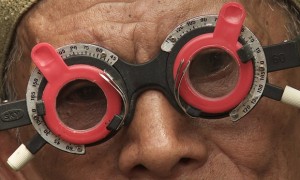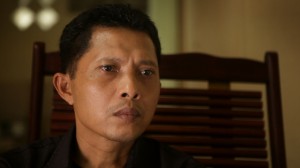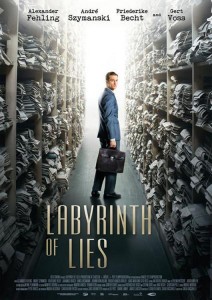The Look of Silence
Directed by Joshua Oppenheimer | 103 min.
As the credits roll, you’ll notice Oppenheimer has plenty of help from anonymous technicians, people on the ground in Indonesia whose lives may be in danger if the government finds out who they are. And so it was with his 2013 film, The Act Of Killing. Interesting that the powers that be still let him back into the country, even though his films poke at the past most of the ruling party would rather not discuss.
This one’s a lot less of a shock to the system than his previous doc, which is to be expected of any sequel. But it works exceptionally well as an accompaniment, as Oppenheimer revisits the material, the perpetrators and survivors of the military coup in 1965 where a million people were executed. This time, instead of interviewing the elder authority himself, he focuses on the brother of a man who was killed during the coup.
Adi (no surname provided) is a travelling optician. While helping these men with their vision he quizzes them about what they did back in the day. Much of that is beyond horrific. Almost no one is willing to take responsibility for their actions while Adi stares them down. This isn’t about revenge, it’s about truth, and maybe absolution. We don’t find much of either.
We also spend a great deal of time with Adi’s aging parents. His mother is a firecracker, with plenty of opinions about life, but I didn’t entirely understand why the focus on his father—blind, nearly deaf, and regularly confused. It felt a little exploitative, though his poverty and lack of medical care provides a powerful contrast to the comfortable life of those who drank the blood (both figuratively and, in some cases, literally) of their fellow citizens. It’s all quietly brutal.
Labyrinth of Lies
Directed by Giulio Ricciarelli | Written by Ricciarelli, Elisabeth Bartel, and Amelie Syberberg | 124 min.
This year’s German entry to the Best Foreign Language film at the Academy Awards has a lot of what the people who give out the little golden statuettes look for: Serious, historically relevant material and a story well-told with big emotional cues and strident plotting. It’s a solid, if predictable, docudrama.
Alexander Fehling is Johann Radmann, a straight-edge public prosecutor in Frankfurt in the mid-1950s. Ambitious and incorruptible—and a fictional composite, incidentally—he takes on the huge issue that no one wants to talk about: war criminals, specifically those 8000 SS officers who worked at Auschwitz who are living comfortably around the country. He gets some blowback from the powers that be, but he and a crusading journalist won’t leave it alone, setting in motion a pacey procedural into the dark heart of the nation.
Radman is written as a cartoonish boy scout in the first act—which nicely sets up his getting a little scuffed up down the road—but the story around him is far too neat, the drama stagey and stiff. It loosens up later on as Radman starts to understand the country’s collective sin touches everyone, including members of his own family.
Anyone looking for the kind of chilly depth we saw in, say, German Oscar winner The Lives Of Others, won’t find their expectations met here, but as an entertaining look at a lesser-known bit of post-war history, it has some rewards.









